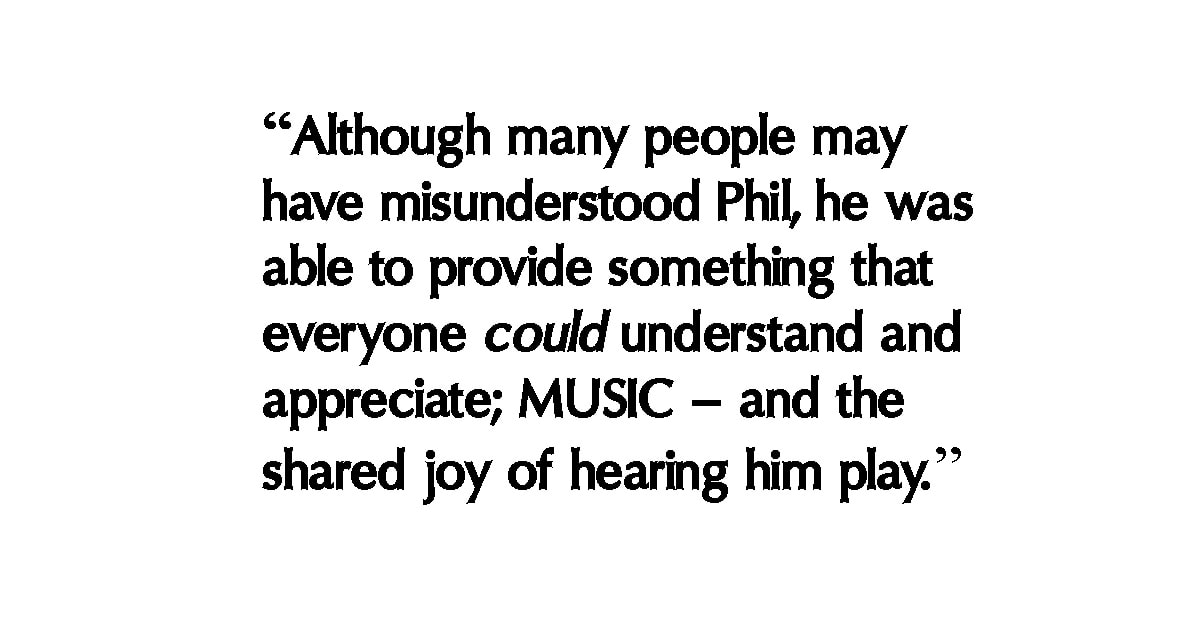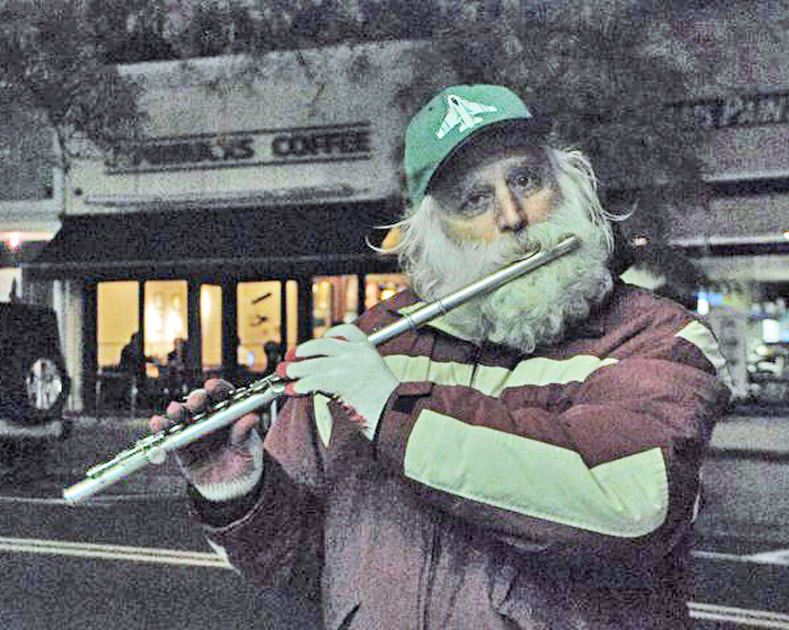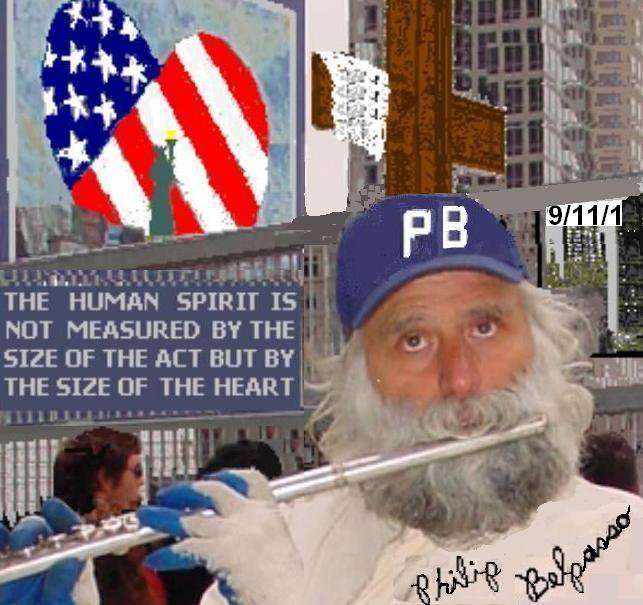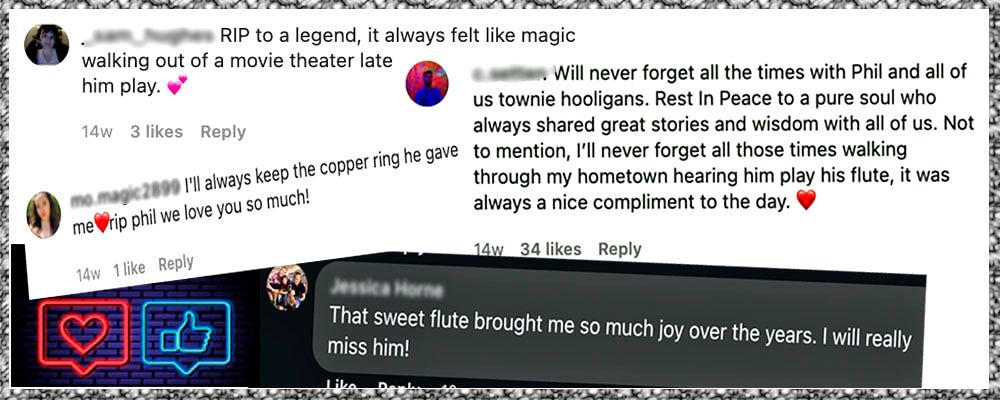Learn more about this series.
THE FLUTE MAN
|
Lauren Massaro grew up in Glen Rock and is a 2022 graduate of Rutgers University. When given the opportunity to develop and deliver a story for a “Digital Storytelling” course this semester, her March inquiry on the Glen Rockers FB page about the late Philip Belpasso received an overwhelming response from people expressing their love for the flute man and their shared interest in learning more about him.
|
|
His unkempt appearance and eccentric demeanor earned him second glances from passersby, and for many, he was simply “The Flute Man,” a fixture on Ridgewood Avenue for more than 20 years. But beyond his soothing, silvery sounds and bushy beard, Philip Belpasso was a fiercely loyal friend.
Growing up, I didn’t know much more about him than the fact that he played the flute up and down the central business strip, sometimes standing right in middle of Ridgewood Avenue. It was only this year that I learned his full name. I can’t recall a single time, whenever I visited neighboring Ridgewood, that I didn’t see him – either serenading patrons as they walked down the street or playing tunes like “Yankee Doodle Dandy” or “America the Beautiful,” as the movies let out at Warner Theater. In preparing for the “Digital Storytelling” course I took at Rutgers this past semester, I was able to sit down with two of Phil’s friends, as well as the Mayor of Ridgewood, to learn more about the flutist. During our conversations, I realized that Phil was much more than a musician: he was a philosopher, an inventor, a confidante, and a storyteller. “Phil always had a story to tell. That was like his main thing. He’d see it in my face: if I had a rough day, he’d wanna make it better,” said Stephan Macchiorola, who developed a friendship with Phil working for six years as a manager at Tito’s Burritos and Wings. “He’d tell me stories about whatever was happening throughout the street, or throughout the day. I really enjoyed the stories, even if they were just random facts. He just knew so much.” Scott Evans, who met Phil when he was 14 and maintained a close relationship with him well into his adulthood, described him as “the smartest man I ever knew.” . “He knew all about the stars,” Scott recalled. “He knew all about Greek mythology, Roman mythology, how they came together. He knew all about the Bible.” Phil’s philosophic musings could be found in pamphlets he created and handed out to the patrons of Ridgewood, or in lengthy videos he narrated on his personal YouTube channel. He often recorded himself speaking to people in the central business district, namely about the apparitions of the “Holy Mother” that he saw on the Warner Theater marquee. After watching Phil’s “Holy Mother” videos, I understood his connection with the movie theater a little better. Each time I exited the Warner after seeing a movie, there he’d be, standing outside, playing the flute. I grew to associate him with the building. He chose it as his stomping grounds, I assumed, because of foot traffic — his flute case was always open, welcoming tips. Maybe that’s where he received the most money. Watching him explain his visions of the saintly figure on the building, I began to see him in a new light. Rather than writing him off as some old guy who played the flute on the street for money, I saw him more as a person with his own independent beliefs and dreams and frames of the world. Knowledge wasn’t the only thing Phil shared. His generosity extended to providing comfort through his music to those devastated by the events of 9/11.
On the morning of September 11, 2001, Phil stationed himself on the corner of 42nd Street and Eighth Avenue, and amidst the chaos and horror, helped in the only way he knew how: by playing the flute. For years following the attack, he serenaded mourning New Yorkers with “The Battle Hymn of the Republic” and “Amazing Grace” on the streets of the city, reaching acclaim as the “Ground Zero Piper.” Scott recalls seeing Phil in New York City by happenstance while working on Wall Street in the early 2000s.
“As I’m figuring out what I’m gonna have for lunch, I thought I was hearing things. I wasn’t in Ridgewood, but I heard Phil’s flute,” Scott said. “I just followed the music, and sure enough, within a block, there was Phil sitting on the ground, a little disheveled, like he usually is, but he was calmer than anyone else.” Even to people who knew him best, a certain mystery surrounded Phil. Many thought he was homeless. He was not.
The flutist was often seen digging through the garbage in search of not only food, but also for tools and trinkets to make jewelry. He had received multiple patents for multiple inventions, said Scott, including one for a copper ring. Phil explained on one of his YouTube videos that the copper and zinc chemistry of the ring would give the wearer health benefits and offered protective qualities to those who fall ill with viruses. To access these protective qualities, he would tell wearers to simply straighten the ring’s metal and “pop it in your mouth.” Although Scott told me that Phil had a house in Fair Lawn, details of his living situation remained scarce. Following a visit to the Fair Lawn house, Scott showed me photos of Phil’s front lawn, where one of Phil’s motorcycles was parked. Scott remarked that he didn’t know where Phil’s other motorcycle was, a yellow Harley Davidson. Phil’s education was evident by the way he wrote and acquired his product patents, said Scott. Although Phil told Scott he never attended college, he did say he spent time at college. “He told me he hung out at Harvard and went into a classroom every once in a while.” “I never imagined it would hit me as hard as it did,” said Stephan, the Tito's Burritos manager, who heard about Phil's death on February 8 through social media. It made me realize that I had a really good relationship with Phil,” he told me. "Maybe even stronger than I realized."
When I asked Susan Knudsen, Mayor of Ridgewood, how she would describe Phil’s presence, she said “Irreplaceable.” She suggested that when individuals who were fixtures in our community depart, “people are impacted, because they are missing someone or something special,” she said. “And Phil was certainly someone special. Phil shared a gift with our community that can never be replaced.” Although many people may have misunderstood Phil, he was able to provide something that everyone could understand and appreciate; MUSIC – and the shared joy of hearing him play. The void he leaves behind is evidenced by some of heartfelt comments expressed on social media, a testament to the love felt for him by the larger community. He had 4,440 friends on Facebook. “I don’t care how sunny a day it is when I go to Ridgewood,” Scott said. “Without Phil, it’s not as bright.”
After exploring — through others — Phil's life and legacy, I felt as if I knew him. His impact on the community could be measured by the sheer volume of people who shared their stories of Phil, expressed their grief at his passing, and communicated their love for the late flutist. Whether you stopped by to listen to it or heard it in passing, Phil’s music brought joy to all. 🎵 |









